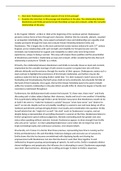How does Shakespeare present aspects of love in this passage?
Examine the view that, in this passage and elsewhere in the play, ‘the relationship between
Desdemona and Emilia presents female friendship as loyal and constant, unlike the romantic
relationships of the play.’
In the tragedy ‘Othello’, written in 1604 at the beginning of the Jacobean period, Shakespeare
presents various forms of love through each character; whether that be romantic, platonic, requited
or unrequited. Interlinking this, many aspects entwined in love and relationships are arguably most
notably portrayed through the loyal and constant female friendship between Emilia and
Desdemona. This is largely due to the stern patriarchal society women endured in early 15 th century
England, and so relationships with such strength and reliability for females became not only
inevitable, but fundamental for support and relatability to others who were living similar
experiences, unique to being a woman. This essay will analyse these qualities and the presentation
of Desdemona and Emilia’s relationship as loyal and constant, whilst considering the idea that such
relationship is exclusive in ‘Othello’ as a whole.
Primarily, the relationship between Desdemona and Emilia is mutually shown as loyal and constant,
emphasised by the unstable marriage of both women to power-corrupted men who will show
ultimate disloyalty and inconstance through the murder of their spouses. Shakespeare creates such a
stark contrast to highlight the prominence of this female relationship, and further ensures the
audience make this link by including Emilia’s belief that “it is their husband’s fault if wives do fall”;
foreboding and foreshadowing that both wives shall not only emotionally, but physically fall (die) at
the hand of their husbands. Once again, the fact the female friendship lasts to the point of death
unlike the romantic relationships in the play (which actually inflict it) shows the degree of loyalty and
consistency maintained throughout.
Furthermore, the disillusionment both women feel towards “O, these men, these men!” and freely
discussing such a taboo subject displays their closeness, loyalty and trust in one another’s friendship.
This is particularly telling through Emilia’s proto-feminist reassurance that Desdemona would not be
at fault if she were to “make her husband a cuckold” because “wives have sense” and “desires for
sport” as men do, despite such an act possibly resulting in a woman’s ears and nose being cut off as
medieval punishment; perhaps bringing Emilia’s true loyalty and consideration into question. Emilia
herself admits that she “might do’t as well I’ the dark” much to Desdemona’s surprise, and yet
despite being a representation of everything shunned in a woman at the time, Desdemona listens to
Emilia’s progressive speech without judgement, liberally overlooking both her gender and class
status when speaking without restraint. Instead, Desdemona appears to draw strength from Emilia
who acts as her ‘saviour’, in return adopting Desdemona’s voice when she no longer has one to
imply everlasting loyalty and continuous constancy, even beyond death.
Structurally, Act 4 Scene 3 is shorter than those previous, representing how time is running out for
Emilia and Desdemona’s life and friendship. Extensive dialogue and excessive use of caesura by
Emilia shows that she has become overwhelmed with displaying loyalty and sharing her
empowerment with Desdemona, but also that she doesn’t want their time together to end
(reflected by frequent pausing and prolonging of speech). As well as this, Emilia’s nonphatic idiolect
shows intelligence and perpetuates the influence she is attempting to assert. Desdemona opposingly
uses short, blunt sentences, showing she is willing and eager to listen to Emilia’s responses.





